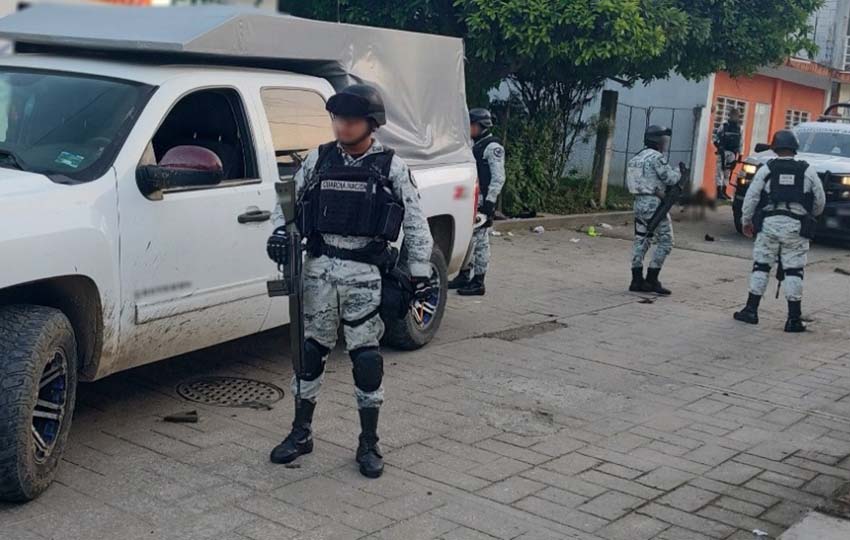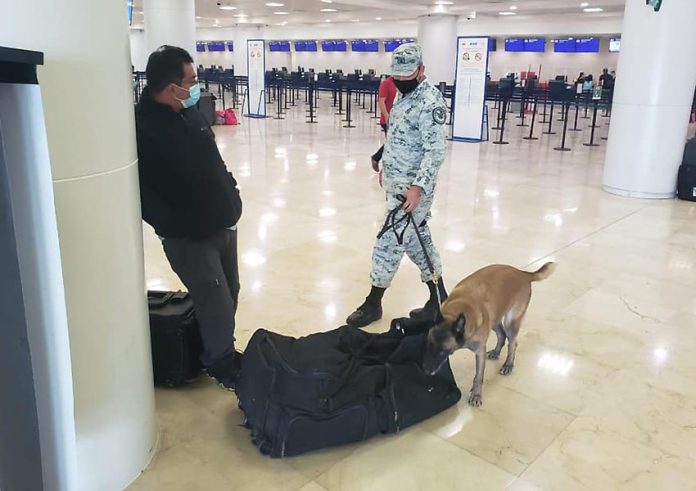Almost three-quarters of Mexicans agree with the government’s plan to continue using the armed forces for public security tasks until 2028, a new poll indicates.
A constitutional bill extending the military’s involvement in public security by four years has already been approved by Congress and will become law once it has been ratified by a majority of Mexico’s state legislatures.
A survey conducted by the polling company Enkoll for the newspaper El País and broadcaster W Radio found that 73% of just over 1,000 respondents agreed with the plan to keep the military on the streets until 2028.
A similar number – 72% – said they agreed with the armed forces having control of customs, airports and border crossings, while 62% of those polled expressed support for the military’s construction of infrastructure projects such as the Felipe Ángeles International Airport and the Maya Train railroad.

The results are welcome news for President López Obrador, who has relied heavily on the military since taking office in late 2018 and seems intent on increasing the role it plays in public life.
Conducted face-to-face at people’s homes between October 14 and 17, the poll also garnered opinions about the trustworthiness of Mexico’s different public security institutions. As has traditionally been the case, the navy was deemed the most trustworthy security force, with 54% of respondents saying they trusted it a lot and an additional 16% expressing “some” confidence in the nation’s marines.
The army, National Guard and state police forces were all seen as less trustworthy, although a majority of respondents indicated they had a lot or at least some confidence in the first two institutions. However, only 13% of those polled said they trusted state police a lot while an additional 20% told Enkoll they maintained some confidence in their officers.
In a more telling revelation, two-thirds of respondents said they had little or no trust in their state police forces.

Asked whether they agreed with López Obrador’s assertion that corruption could be avoided by using the military to build public infrastructure projects, almost six in 10 respondents said they did. Just over one in 10 said they very much agreed with the claim while 47% indicated more restrained concurrence with the president.
Although Mexican newspapers have recently been filled with reports detailing the contents of a massive trove of emails and documents stolen from the Ministry of National Defense’s IT system by the Guacamaya hacking group, 71% of respondents said they hadn’t heard about the security breach and subsequent leak.
López Obrador downplayed the seriousness of the security breach, asserting that he didn’t expect any negative consequences from it, while Defense Minister Luis Cresencio Sandoval declined to meet with lawmakers to discuss the hacking incident. That response was neither particularly popular or unpopular among those polled, with 41% of respondents praising the government’s handling of the issue and 34% criticizing it. An additional 25% declined to comment on the government’s response or said they didn’t know anything about it.
A clear majority did, however, assert that the army’s digital security personnel “must assume responsibility” for the hacking of the army’s servers, a breach that resulted in the theft and subsequent leaking of six terabytes of data.
The media’s obtention of confidential and sensitive information has led to the publication of a huge number of revelatory reports, including ones on López Obrador’s health problems, the government’s plan to create an army-run commercial airline, a soldier’s sale of weapons to a criminal organization and the Mexican military’s planning and operational shortcomings.
In response to additional questions about the military, 53% of those polled said they believed that the army was involved in the 2014 disappearance of 43 students in Iguala, Guerrero, while 37% said that the army has a lot of influence over the nation’s politics. An additional 28% said the army exerted some influence, while just 8% said it had no clout at all.
Militarization is currently a hot-button issue in Mexico as the federal government seeks to augment the role the armed forces play in public life. López Obrador recently asserted that military presence is essential to guarantee peace, while he frequently stresses that his administration – unlike its predecessors – doesn’t tolerate human rights abuses perpetrated by the army and navy.
For their part, opposition parties, human rights organizations and others argue that the ongoing use of the armed forces for public security tasks only perpetuates a failed security strategy and comes with the risk of yet more human rights violations being committed by the generally “trustworthy” military.
A majority of Mexicans, the El País/W Radio poll suggests, side with the government on the issue, perhaps believing, rightly or wrongly, that the country’s perilous security situation – there have been over 132,000 homicides since López Obrador took office – would be even worse without soldiers and marines patrolling the nation’s streets.
With reports from El País
